
TOWARD A NEW CIVILIZATION: WHY WE MUST TAME OUR INSTINCTS TO SAVE OUR WORLD
BY ARTHUR BLECH (PUBLISHED 2005 BY PROMETHEUS BOOKS. ISBN 10: 159-1023505) 452 pages
Arthur Blech was a man who had a great deal to say about the state of human affairs. A humanist whose parents were killed during the Holocaust, Blech (1923-2011) was the author of three books, all of which merit reading. This particular volume focuses on the human race’s proclivity toward over-population, and the resulting strain on the environment. His thesis is threefold: First, he analyzes the failings of man and nature; secondly, he examines the available options; and finally he discusses possible solutions. He paints a grim portrait of what awaits us if we do not, as a species, awake from our comforting mythological slumber and take real action, as the global extinction of the human species increasingly looms as a very real possibility.
While reason and the scientific method have enhanced our lives in countless ways, religiously inspired ethics have tended to exert quite the opposite effect on the human animal and on society. As Blech rightly points out, while fifty million people die each year from starvation and hunger-related conditions, religious leaders continue to attack abortion and birth control. That such people seem unable or unwilling to fathom the utter depravity of their proclamations is a telling indictment against the morality of their faith.
The guilt of the world’s religions in this horrifying scenario is manifestly evident not only in their near-universal support of population growth (“Be fruitful, multiply, fill the earth…” Gen. 22-27), but also in their desire to foster an Armageddon mentality (“You shall receive your reward only on the Day of Resurrection.” Koran, Sura 3:185). Blech pulls no punches in exposing religion as the fundamental root source of the problem. The various “holy” texts speak for themselves.
Blech covers a wide range of topics to support his theses, including not only some of the fundamental branches of philosophy including ethics, epistemology, and metaphysics, but also history, science and biotechnology. It would be difficult, given the diversity of topics employed, to find universal acceptance of all these disparate areas among his readers, who may take exception to any number of his points. For example, his discussion of perception, while intriguing, will surely be attacked by many contemporary epistemologists. David Kelley, for example, as written eloquently on this issue in his book The Evidence of the Senses. Blech presents as axiomatic the notion that the mind does not perceive an object, but only the idea of an object. He says “the mind does not perceive anything external to itself, but only its own ideas.”
Although this is surely not Blech’s intention, such a statement opens the door to mystical interpretations of the universe; one might reasonably ask where those ideas came from, if not from an observable, existential reality. The mind cannot create reality, in can only interpret it. Perceptions are sensations that are integrated and interpreted by the mind, allowing us to be aware of entities, the various “things” that are “out there.” A better way of re-phrasing it would be something like: The senses perceive existential reality, and our minds interpret the information provided by our senses. Atheists and other freethinkers must be extremely careful in word usage, as the anti-rationalists in our midst will look for any perceived flaws in what we write and say.
This does not detract from the importance of the book’s main themes, however. Over-population and over-consumption are straining the earth’s resources to the point of crisis, and real solutions must be global in scope. Neither of the two major political parties in the United States will address these issues: the Republicans because their fundamentalist religious ideology either denies that the problems exist, or else that their imaginary savior will return “soon” to save us from our own excesses, and the Democrats because they lack the courage and integrity to risk losing votes.
Blech’s theses are sound, and this book is a wake-up call not only for freethinkers, but for everyone in society who is concerned about our future.
We the people must find other ways to overcome social, cultural, religious, and economic hindrances which tend to exacerbate the problems. Only logic and reason can provide the answers; as in all other human issues, religion has proven itself to be morally bankrupt.
Categories: Book Reviews
